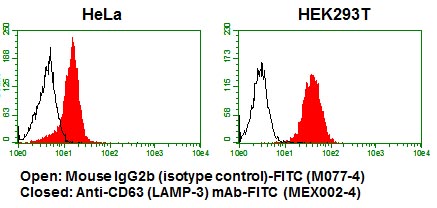Antibody detailed product information
| Code No. | MEX002-4 | |
| Anti-CD63 (LAMP-3) mAb-FITC | ||
| Price | ¥35,200 | |
| Size | 100 µL (500 µg/mL) | |
| Availability (in Japan) | 10 or more
(In Japan at 00:05, Apr 20, 2024 in JST) |
|
| Clonality | Monoclonal | |
| Clone | C047-1 | |
| Isotype (Immunized Animal) |
Mouse IgG2bκ | |
| Applications | FCM 5 µg/mL |
|
| Immunogen (Antigen) |
human prostate carcinoma cell line (PC3) derived exosomes (prepared by ultracentrifugation from cultured supernatant) | |
| Reactivity [Gene ID] | Human[928] |
|
| Storage buffer | 500 µg/mL in PBS containing 1% BSA and 0.1% ProClin 150 | |
| Storage temp. | 4°C | |
| Conjugate | FITC | |
| Manufacturer | MBL | |
| Alternative names | MIC3, MRP-1, BTCC-1, DRAP-27, TSPAN29, TSPAN-29 | |
| Background | CD63 antigen, also known as LAMP-3, is a tetraspanin characterized by four transmembrane domains and a member of the transmembrane 4 superfamily. CD63 is the first characterized tetraspanin. CD63 has broad tissue distribution and may play multiple roles in a variety of cellular processes such as immune response and tumorigenesis, but its function has not been elucidated entirely. It is reported that CD63 is abundant in tetraspanin-enriched microdomains (TEMs) and a certain type of cellular compartment, such as late endosomes and lysosomes, while the tetraspanin-rich small lipid bilayers are secreted into extracellular fluid as a certain type of extracellular vesicles, called exosome. Because of various exosome features, CD63, one of the representative exosome surface proteins, is thought to be related to intercellular communication. | |
| Related products | MEX001-4 Anti-CD9 mAb-FITC MEX001-3 Anti-CD9 mAb MEX002-3 Anti-CD63 (LAMP-3) mAb MEX003-3 Anti-CD81 (TAPA1) mAb MEX003-4 Anti-CD81 (TAPA1) mAb-FITC MEX001-6 Anti-CD9 mAb-Biotin MEX002-6 Anti-CD63 (LAMP-3) mAb-Biotin MEX003-6 Anti-CD81 (TAPA1) mAb-Biotin M077-4 Mouse IgG2b (isotype control)-FITC MEX001-12 Anti-CD9 mAb-ALP MEX002-12 Anti-CD63 (LAMP-3) mAb-ALP MEX003-12 Anti-CD81 (TAPA1) mAb-ALP D263-3 Anti-CD63 (LAMP-3) (Mouse) mAb |
|
| Product category | Research area:Cancer Cell surface antigens Exosomes | |
| Data |  |
|
| References |
|
|
- The availability is based on the information in Japan at 00:05, Apr 20, 2024 in JST.
- The special price is shown in red color.
- Please note that products cannot be ordered from this website. To purchase the items listed in this website, please contact us or local distributers.
- Abbreviations for applications:
WB: Western Blotting, IH: Immunohistochemistry, IC: Immunocytochemistry, IP: Immunoprecipitation
FCM: Flow Cytometry, NT: Neutralization, IF: Immunofluorescence, RIP: RNP Immunoprecipitation
ChIP: Chromatin Immunoprecipitation, CoIP: Co-Immunoprecipitation
DB: Dot Blotting, NB: Northern Blotting, RNA FISH: RNA Fluorescence in situ hybridization - For applications and reactivity:
*: The use is reported in a research article (Not tested by MBL). Please check the data sheet for detailed information.
**: The use is reported from the licenser (Under evaluation or not tested by MBL).
- For storage temparature: RT: room temparature
- Please note that products in this website might be changed or discontinued without notification in advance for quality improvement.
 Copyright (C)2015 Medical & Biological Laboratories Co., Ltd. All Rights Reserve
Copyright (C)2015 Medical & Biological Laboratories Co., Ltd. All Rights Reserve